In the arid Hammada Desert, on the border between Morocco and Mauritania, live nearly two hundred thousand Sahrawi refugees; an area ceded to “temporary” sovereignty by the Algerian government to the Sahrawi Arab Democratic Republic (SARD), which has been ruling in exile for nearly fifty years. An alternation of waiting, war and diplomacy. An hourglass without sand. In January of this year, the latest congress of the Polisario Front-the militant and political organization founded in 1973-clarified, in part, relations with Morocco: “Intensify the struggle to end the occupation and restore sovereignty.” But the people resist, suspended, amid banderas blancas and old, heavy Kalashnikovs.
Azma is the first face outside the Tindouf airport. Originally from the village of Dakhla in the occupied territories, he has been fighting against the Rabat government for 15 years. He is now my driver, his eyes intense in the dark as a signal of his people’s determination.
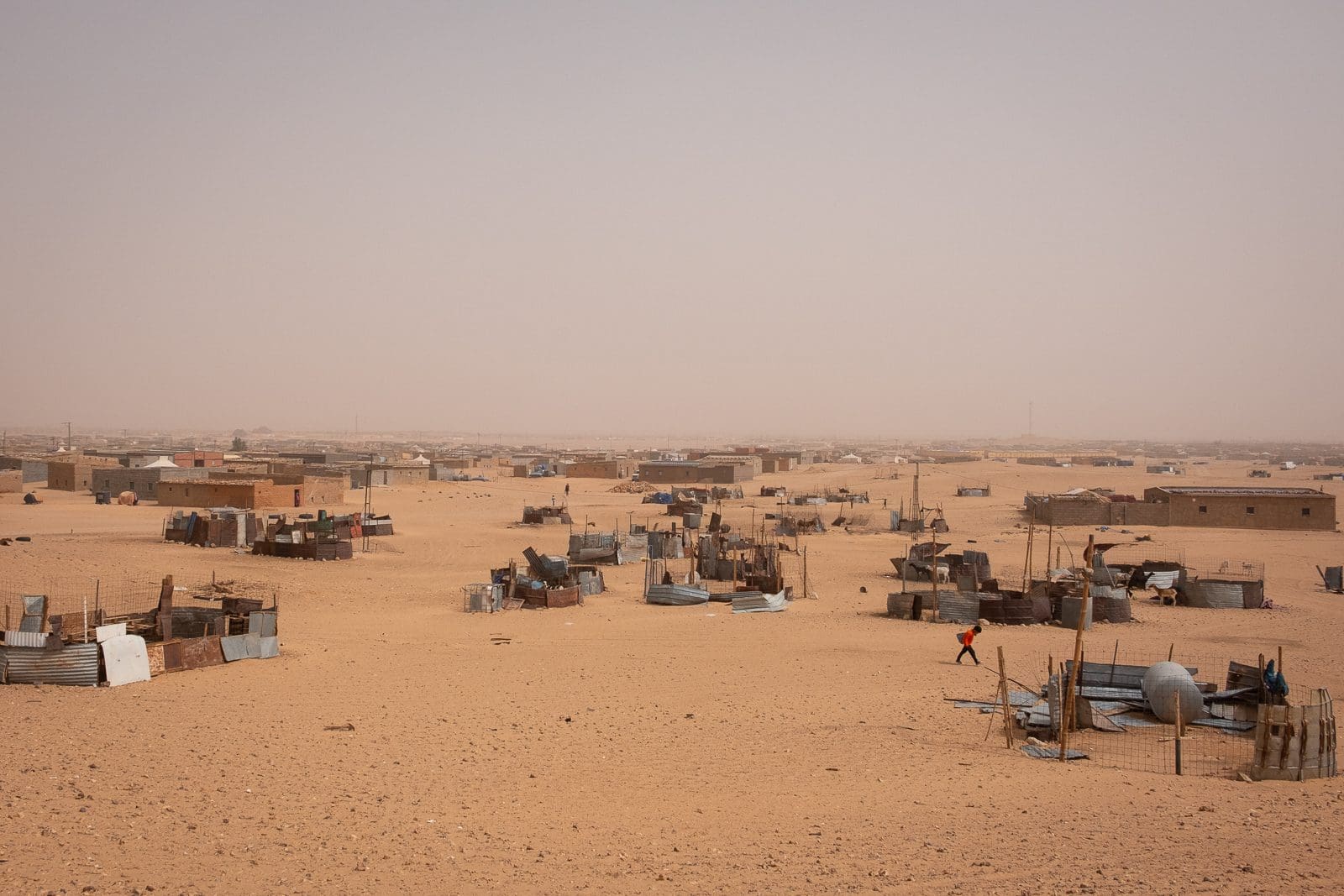
The Sahrawi border-at the ‘entrance to the Wilaya of El Aaiun-is not far away. It is the only point where the military in Algiers hands over visiting foreign nationals to RASD guards. From there on, traffic circles mark the tracks leading to the refugee camps, an area organized into five Wilaya (provinces) and thirty Daira (villages), where exiles now live. The disputed Western Sahara was born in the 1930s and is marked by Spanish decolonization, Moroccan greed and the self-determination of a nomadic people in a 266,000-square-kilometer territory with fishy coastlines and phosphate deposits located in the great Bou Craa mine.
The stories of elderly heads of households and young people anguished by the future strike me as I walk through their histories with my mind.
Sukaina is eighty-four years old, her face cut by the cross light filtering into her home in Barrio 4 in La Guera’s Daira; the older woman is a real transfiguration of her now-divided land, a body that has lived through the three harshest generations for the Saharawi people. Until 1975 the inhabitants waited for a referendum for independence established by the UN, then a fifteen-year war, the arbitrary construction by Mohammed VI of the “Berm” – the wall of shame for the Saharawis – and the division between the “useful” territories, those occupied by Morocco and rich in metal deposits, and the areas liberated by the Polisario Front. Finally, in the months of the Moroccan Green March, a military invasion to alter the outcome of the consultation, Sukaina was forced to flee with her family. Her son Abdellhai translates her short story. “Polisario Front trucks arrived immediately; in the sky, two military planes were trying to spot those fleeing; women hid their children and the elderly under their clothes. In five days, we arrived in the camps.” Since 1991 there was a phase of truce, the OAU-UN resolution on the referend; then, in November 2020, the casus belli, namely the Sahrawi women’s protest at the El Guarguarat pass; Moroccan boots opened fire, and a new conflict began, still ongoing.
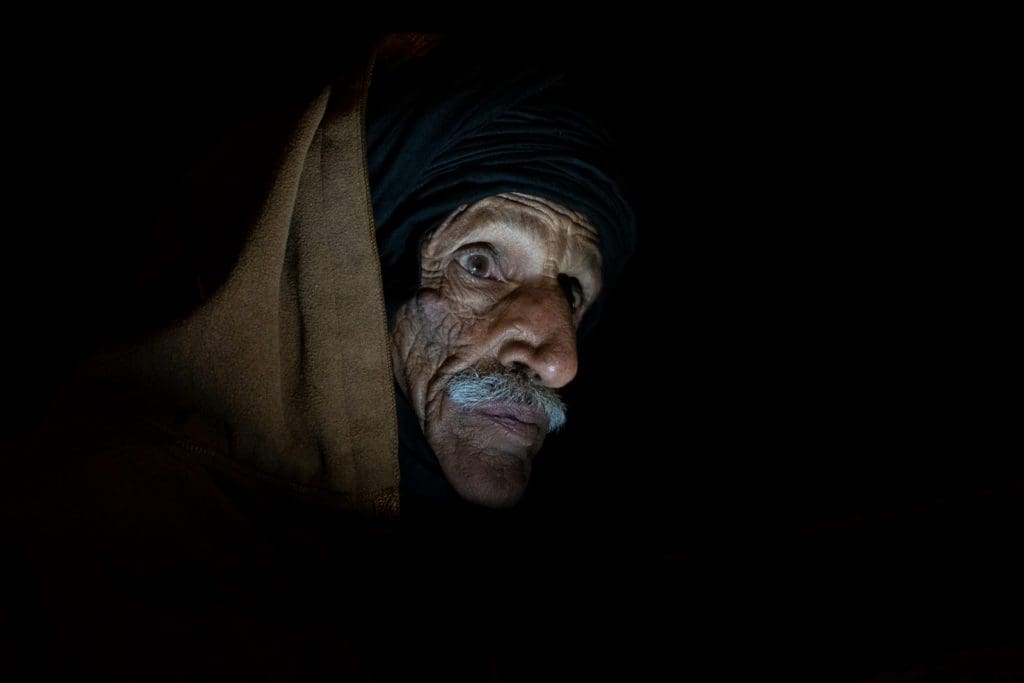
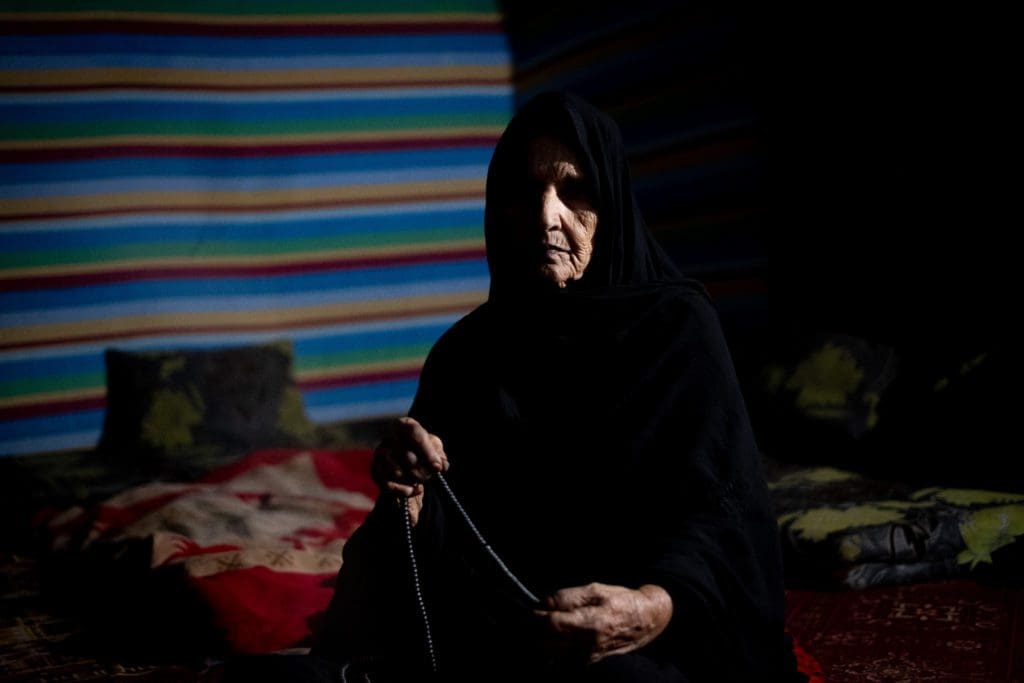
Right from the start, the perception of initial well-being seems to crumble. The prolonged wait for peace pushes toward a frustrating and growing loneliness. On the doorstep, Hira, a blind former military father and elderly mother, hears our footsteps. “When I was six, I went to Castilla – La Mancha; I went back five times in the summer, now I am twenty-two, and I know that I will have nothing in this life. I could have been a nurse or a teacher, but I can’t study; it’s like another land here.”
Hira is not the only one who senses a missing space. Kaver in his tent speaks as an adult. “I am ready to go to war if there is a collective call, but gaining freedom through armed conflict will be a sacrifice for us as well as for them. We are all human beings and we are of the same flesh.” He refers to the Moroccans, whom he never mentions. “The Saharawi people have survived for a long time, we will wait for what is missing. It is a matter of a strong heart.”
Khalia is the youngest of my host family. She appears serene as we walk among the new cinder-brick buildings; those who can earmark the old sand dwellings, crumbled by rain and without roofs, as pens for chickens and wizened goats. She excitedly drags her feet through the wet sand after an overnight downpour. She has found sprouts and guards them, naively letting them die, in the palm of her hand, whose curved wrinkles seem to smile.
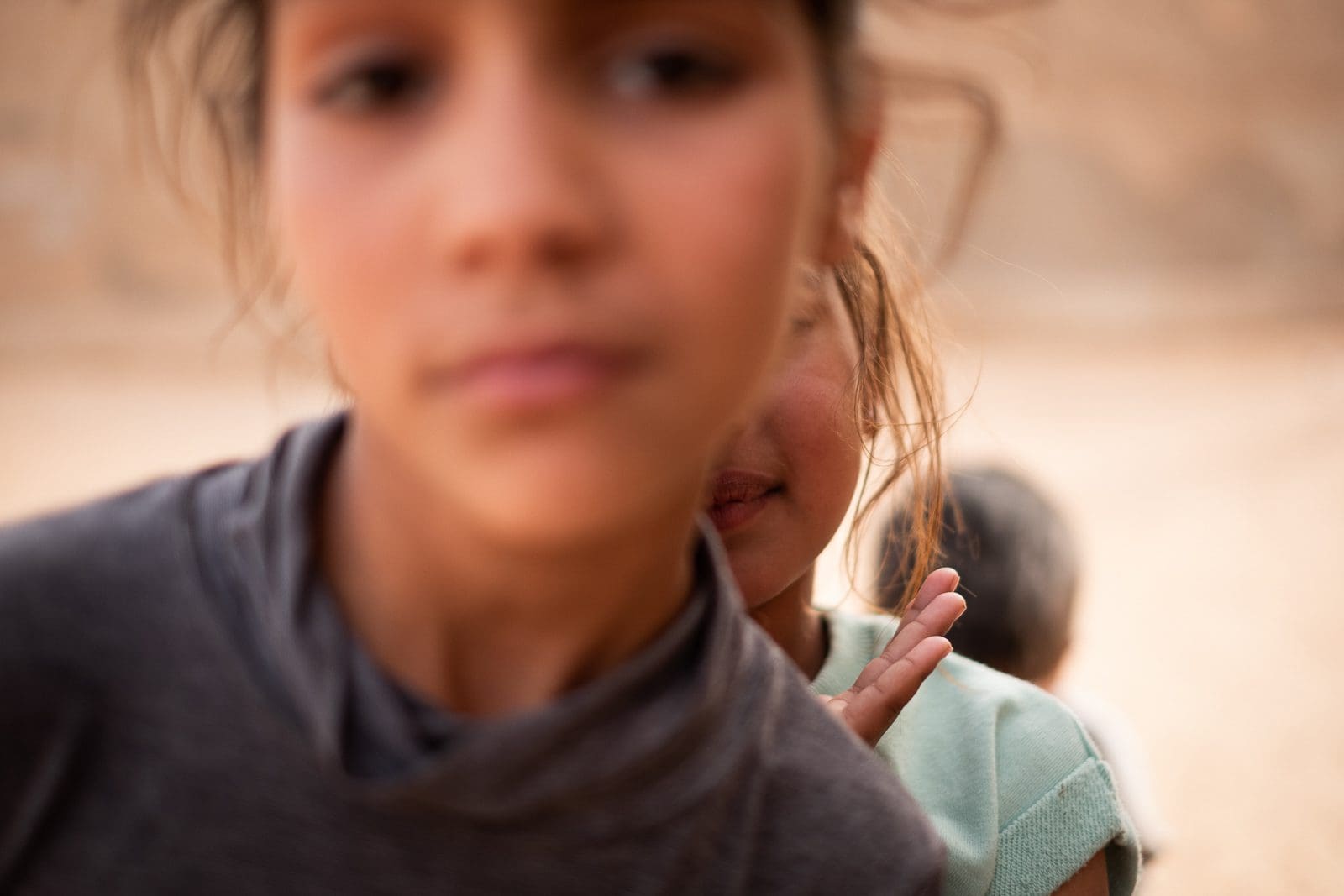
Survival in the camps depends on international humanitarian aid-WFP, UNICEF and the UN. It is then up to the local communities to take care of the distribution of water and food to the refugees. Some solidarity associations promote long-distance adoptions instead. In addition, there are financing instruments that benefit families for sustainable farming or ranching projects, accompanied by training programs. Many, born in the camps and now in their 50s, have gone to study in Cuba; some have found work in Spain and send remittances to their families; others have returned to practice medicine in hospitals in Rabouni or Aguenit. Here, however, there is a lack of raw materials for galenic medicines or intubating ointment that is poured into containers with a spoon. Only those with Spanish citizenship-because the family was registered in the colonizing country-have freedom of movement.
I have time before dinner waiting for the last warm bread to arrive. Sid Brahim displays his new gift in the tent with the large embroidered flowers. The dolphin and the blue cloth in the background are a visual oxymoron, for all the young people in the camp the mirage of something that has never really appeared before their eyes. “Mullay, is this the sea?” is the question the children always ask their chaperone the first year of the summer camp, active in Italy with the “Little Ambassadors for Peace” project. “No, it’s a swimming pool!” It is not easy to grasp deep down the uncertain state of mind of this people.
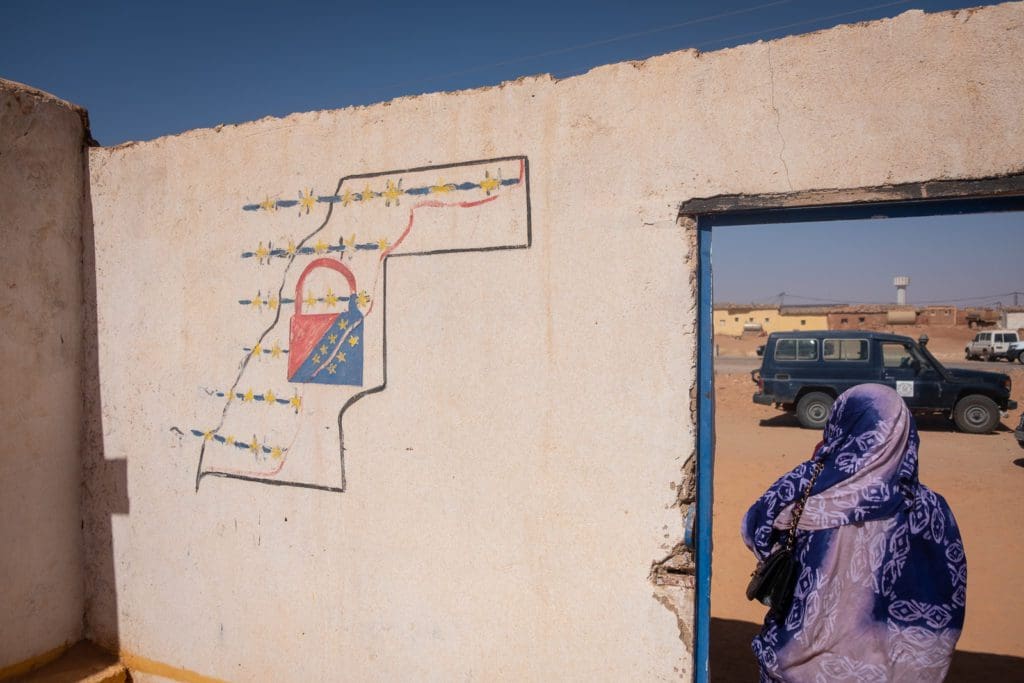
For the last night in the village, I change home and, perhaps, perspective. Tawualo fought until December in the military’s support groups, and the difference with those who never went to the front is stark for him. “To wish for conflict is not to have seen the eyes of the prisoners. Killing an Arab brother is a weakness. Moroccans pay for the government’s mistakes and are forced into war to buy bread; we are making it to return to our land, Western Sahara.” On the evolution of the guerrilla war, he is even more adamant as if to reassure a large audience present and absorbed. “I want to wait a little longer; you are our palomas blancas of diplomacy. The words you bring out of this house are stronger and more intelligent than politics, which is sick. You represent a medicine, a pill that makes an abandoned body aware of the reaction. Before returning to the common room, he raises his arms, mimicking a scale. “We are hovering between a white flag and a machine gun.”
In the inner courtyard, it is almost dark. Leila leans against the long wall, counting. Her sister Lamina and cousin Alwaha approach without being heard. “One, two, three, star!” is a traditional game also here. With eyes open again, the wish is to find themselves there, free, in the land half a century awaited.

